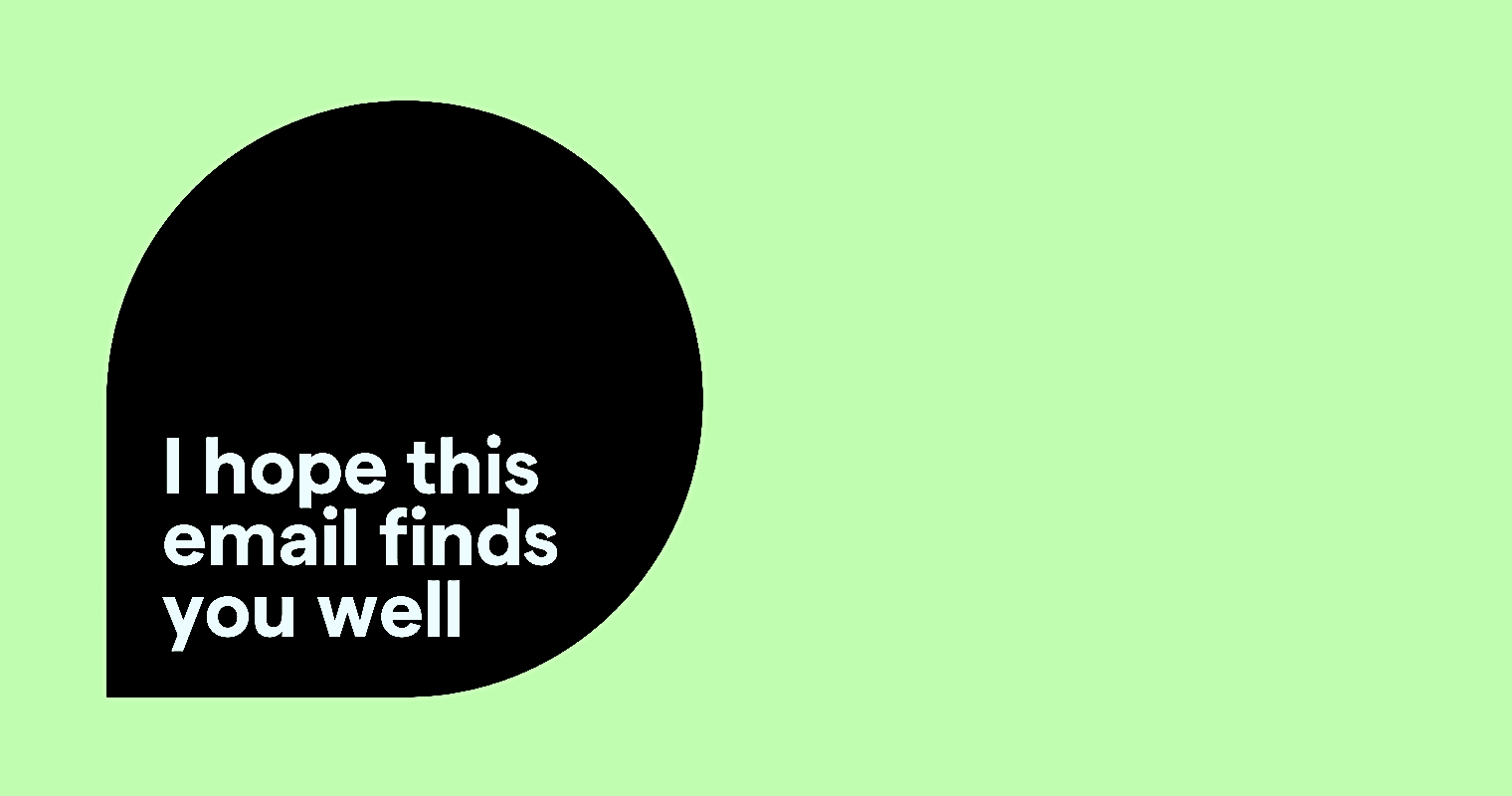“I Hope This Email Finds You Well?”: Alternatives and Best Practices
Published on July 1st, 2024
Email has become an indispensable tool when it comes to professional and personal communication. A typical phrase that frequently appears at the beginning of these emails is "I hope this email finds you well." While polite and well-intentioned, this phrase has become somewhat cliché due to its overuse.
This comprehensive guide delves into the meaning of this ubiquitous phrase, explores its alternatives, and provides strategies for crafting more engaging and personalized email greetings. Whether you're a seasoned professional or a newcomer to email etiquette, this guide will help you elevate your email communication.
The Meaning of “I Hope This Email Finds You Well”
What Does “I Hope This Email Finds You Well” Mean?
The phrase "I hope this email finds you well" is a courteous way to start an email. It expresses the sender's wish that the recipient is in good health and good spirits. This opening sets a positive tone for the message, indicating that the sender cares about the recipient's well-being.
Is It Correct to Say “I Hope This Email Finds You Well”?
Yes, it is grammatically correct and widely accepted in both professional and casual email correspondence. The phrase serves as a polite opener that helps to soften the forthcoming message, regardless of its nature. However, due to its frequent use, it can sometimes come off as insincere or formulaic.
The Origins and Evolution of the Phrase
The phrase likely evolved from traditional letter writing etiquette, where it was common to begin with pleasantries and well-wishes. As email became the dominant form of written communication, many of these traditional greetings transitioned into digital correspondence. Over time, "I hope this email finds you well" became a go-to opener for many, leading to its current status as a ubiquitous but somewhat overused phrase.
Why Seek Alternatives?
The Overuse and Impact
While "I hope this email finds you well" is polite and considerate, its overuse has led to a diminished impact. Recipients, accustomed to seeing this phrase, may skim over it without giving it much thought. This can affect the overall engagement with the email content, making the message feel generic or impersonal.
The Rise of the “I Hope This Email Finds You Well” Meme
The internet’s reaction to the overuse of this phrase has spawned a variety of memes poking fun at its ubiquity. These memes highlight how predictable and uninspired this greeting can feel, especially when used repetitively. The humor in these memes underscores a broader sentiment that it's time to refresh our email greetings.
Alternatives to “I Hope This Email Finds You Well”
To keep your emails engaging and personal, consider these alternatives:
Formal Alternatives
- I trust you are doing well.
- I hope you are having a productive week.
- I hope you are doing well and staying safe.
Informal Alternatives
- I hope you’re having a great day.
- I hope everything is going well on your end.
- I hope you’re enjoying your week.
Creative and Personalized Alternatives
- I hope this message brightens your day.
- I hope you’re as excited about this project as I am.
- I hope you had a fantastic weekend.
Industry-Specific Alternatives
- I hope the new quarter is off to a great start for you.
- I hope your recent product launch was successful.
- I trust your team is doing well amidst the busy season.
Crafting Personalized Email Greetings
Understanding the Context
The key to a great email greeting is understanding the context of your message and the relationship with the recipient. A personalized touch can make a significant difference, transforming a routine email into a meaningful communication.
Consider the Recipient’s Situation
If you’re aware of recent events in the recipient’s life, referencing them can show genuine interest and care. For example:
- I hope you had a great time at the conference last week.
- I hope your recent project is going well.
Incorporate Relevant Details
Using details relevant to the recipient's industry or recent interactions you’ve had can add a personal touch. For example:
- I hope the new quarter is off to a great start for you.
- I hope the recent product launch was successful.
Enhancing Your Email Greetings with AI Tools
Leveraging AI for Better Email Openers
In today's digital age, AI tools can significantly enhance your email communication. One such tool is the HireQuotient AI Email Generator. This innovative tool can help you craft personalized and engaging email greetings effortlessly.
How the HireQuotient AI Email Generator Works
The AI Email Generator uses advanced algorithms to analyze your email content and suggest personalized greetings and openers based on the recipient's information and the context of your message. By leveraging AI, you can move beyond generic phrases like "I hope this email finds you well" and create unique, impactful greetings.
Benefits of Using the HireQuotient AI Email Generator
- Personalization at Scale: The AI tool allows you to personalize emails for large audiences without compromising on quality.
- Time Efficiency: Save time by quickly generating tailored greetings and openers for your emails.
- Enhanced Engagement: Personalized and relevant email greetings can lead to better recipient engagement and response rates.
Practical Examples of AI-Generated Greetings
Here are a few examples of how the HireQuotient AI Email Generator can transform your email openers:
- Hi [Recipient Name], I hope your recent project review went well.
- Hello [Recipient Name], I trust you're enjoying the beautiful weather this week.
- Dear [Recipient Name], I hope your team is thriving during this busy season.
How to Respond to “I Hope This Email Finds You Well”
When you receive an email with this greeting, here are a few ways to respond that maintain professionalism and politeness:
- Thank you for your kind words. I am well, and I hope the same for you.
- Thank you! I’m doing great and hope you are too.
- I appreciate your well wishes. I am having a productive week and hope you are as well.
Enhancing Email Greetings with Cultural Sensitivity
Understanding Cultural Differences
When communicating with international colleagues or clients, it's important to be aware of cultural differences in email etiquette. For instance, what may be considered polite and formal in one culture might come off as overly familiar or informal in another.
Adapting Greetings Appropriately
Tailor your greetings to fit the cultural context of your recipient. For example:
- In Japanese business emails, a common greeting is "I hope you are in good health and spirits."
- In French, you might start with "I hope you are doing well," but a more formal tone is often preferred.
Avoiding Misunderstandings
Avoid idiomatic expressions or slang that might not translate well across cultures. Stick to clear and universally understood language to ensure your message is well-received.
Conclusion
While “I hope this email finds you well” is a polite and acceptable way to start an email, exploring alternatives can help make your communications more engaging and personalized. Whether you opt for a formal, informal, or creative approach, tailoring your greeting to the recipient can enhance the effectiveness of your message. By considering the context and incorporating relevant details, you can create a more impactful and memorable email greeting.
Email communication is an art that balances politeness with personalization. By moving beyond standard phrases and genuinely connecting with your recipients, you can make every email count. Leveraging tools like the HireQuotient AI Email Generator can further enhance your email writing, making it easier to craft personalized and engaging messages. So, the next time you draft an email, think about how you can start it in a way that truly resonates with your audience. Happy emailing!
Authors

Vinaya Birkodi
Vinaya is a Social Media Strategist and Content Writer with a passion for content that connects. She blends data, trends, and storytelling to craft content that doesn’t just perform it resonates. When she’s not decoding algorithms or building brand love online, you’ll find her exploring creative outlets like photography and short-form video. Always online, always on-brand.
Hire the best without stress
Ask us how
Never Miss The Updates
We cover all recruitment, talent analytics, L&D, DEI, pre-employment, candidate screening, and hiring tools. Join our force & subscribe now!
Stay On Top Of Everything In HR

